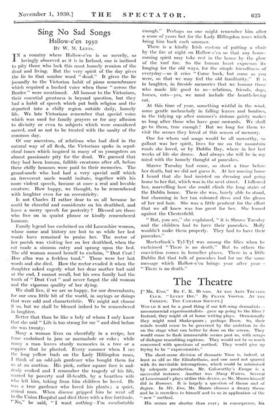Sing No Sad Songs
Hallow-e'en 1930 By W. M. LET-rs,
Of our ancestors, of relations who had died in the natural way of all flesh, the Victorians spoke in sepul- chral tones which inspired in many of us youngsters an almost passionate pity for the dead. We guessed that they had been human, fallible creatures after all, before these chilly honours were paid to their memories. The grand-uncle who had had a very special sniff which an irreverent uncle would imitate, together with his more violent speech, became at once a real and lovable creature. How happy, we thought, to be remembered with laughter even for an eccentricity.
Is not Charles II rather dear to us all because he could be cheerful and considerate on his deathbed, and leave a merry speech for posterity ? Blessed are those who live on in quaint phrase or kindly remembered humour.
Family legend has enshrined an old Lancashire woman, whose name and history are lost to us while her last words have remained to praise her. The rector of her parish was visiting her on her deathbed, when the cat made a sinuous entry and sprang upon the bed. The old woman roused herself to exclaim, " Drat t'cat I . Hoo allus was a feckless toad." Those were her last words and she died. How the rector evaded it when the daughter asked eagerly what her dear mother had said at the end, I cannot recall, but his own family had the truth of " Drat t'cat " and never forgot the old woman and the vigorous quality of her dying.
We shall live, if we are so happy, for our descendants, for our own little bit of the world, in sayings or doings that were odd and characteristic. We might not choose it so, but we shall be blessed indeed to be remembered in laughter.
Better that than be like a lady of whom I only know that she said " Life is too strong for me " and died before she was twenty.
Many a woman lives on cheerfully in a recipe, her fame enshrined hi jam or marmalade or cake ; while many a man leaves sturdy memories in a tree or a coppice that he planted. Every summer when I see the long yellow buds on the Lady Hillingdon roses, I think of an odd-job gardener who bought them for us at an auction. His pink, rather square face is sud- denly evoked and I remember the tragedy of his life, marred by poverty and ill-health, by a heartless wife who left him, taking from him children he loved. He was a true gardener who loved his plants ; a quiet, stoical man. When disease gripped him he went off to the Union Hospital and died there with a fine fortitude. No," he said, " I want nothing—I'm comfortable
enough." Perhaps no one might remember him after a score of years but for the Lady Hillingdon roses which bring him back each summer.
There is a kindly Irish custom of putting a chair by the fire at night on Hallow-e'en so that any home- coming spirit may take rest in the house by the glow of the turf fire. So the human heart expresses its longing for the old ways, for the simple friendliness of everyday—so it cries " Come back, but conic as you were, so that we may feel the old familiarity." It is in laughter, in fireside memories that we honour those who made life good to us—relations, friends, dogs, horses, cats—yes, we must include the hearth-loving cat.
At this time of year, something wistful in the wind, some gentle melancholy in falling leaves and bonfires, in the tidying up after summer's riotous gaiety makes us long after those who have gone onwards. We shall go to them, true enough ! But we long for them to visit the scenes they loved at this season of memory.
One for whom sad songs would be all unworthy, so gallant was her spirit, lives for me on the mountain roads she loved, or by Dublin Bay, where in her last weeks of life she drove. And always she will be in my mind with the homely thought of pancakes.
Shrove Tuesday had come, so short a time before her death, but we did not guess it. At her nursing home I heard that she had insisted on dressing and going home to her flat, which was in the next street. I followed her, marvelling how she could climb the long stairs of the Dublin house. There she was, barely able to stand, but charming in her tan coloured dress and the gleam of her red hair. She was a little penitent for the effort that we all knew was too great for her. She leaned against the Chesterfield.
" Bait, you see," she explained, " it is Shrove Tuesday and the children had to have their pancakes. Molly wouldn't make them properly. They had to have their pancakes."
Maeterlinck's Tyl-Tyl was among the lilies when he exclaimed " There is no death." But to others the conviction conies in homelier places. There in a little Dublin flat that talk of pancakes had for me the same message which Hallow-e'en brings year after year- " There is no death."










































 Previous page
Previous page